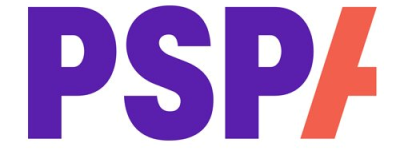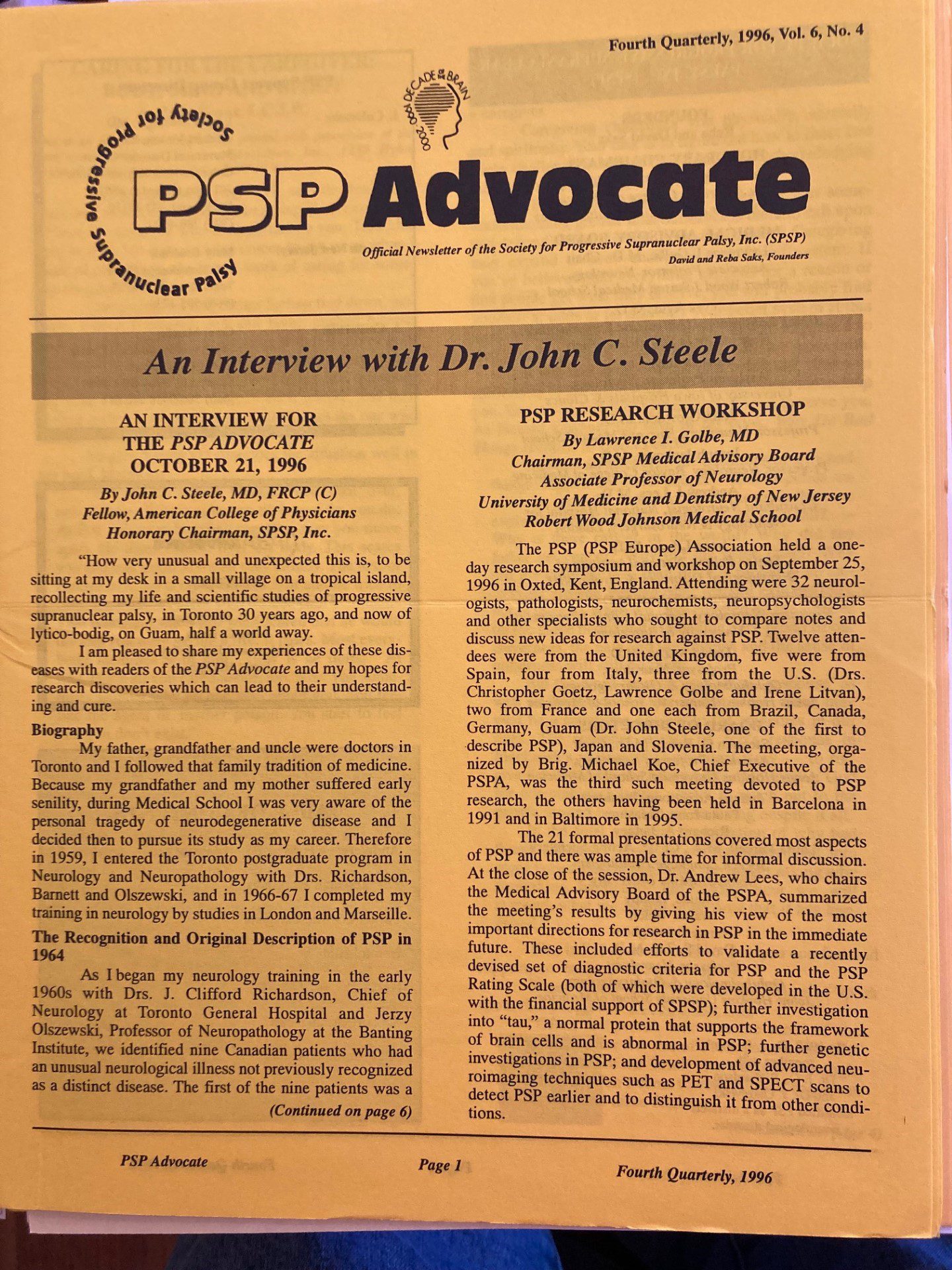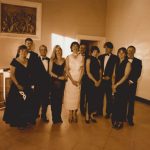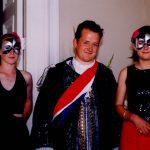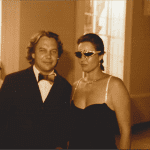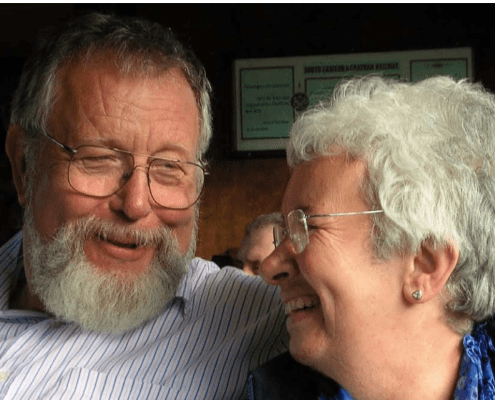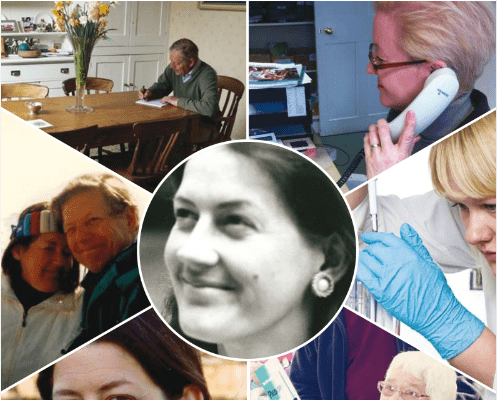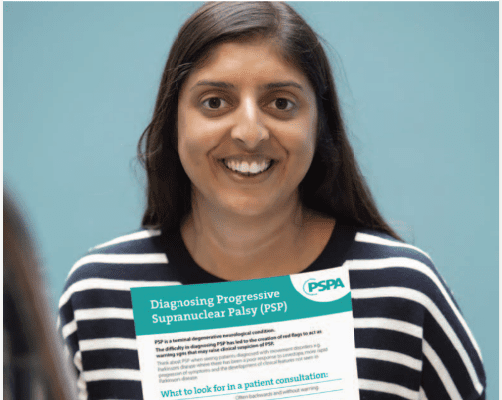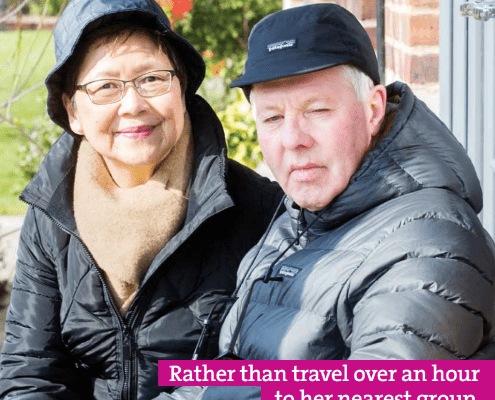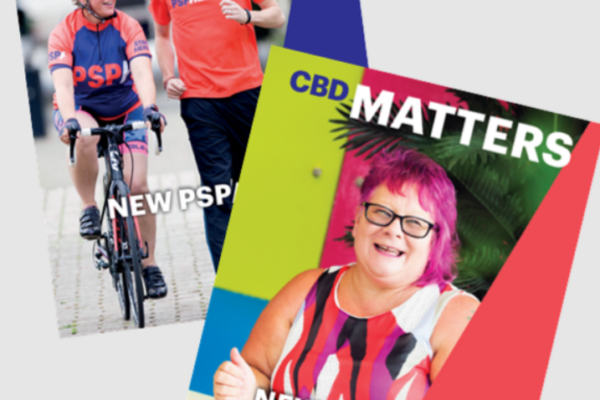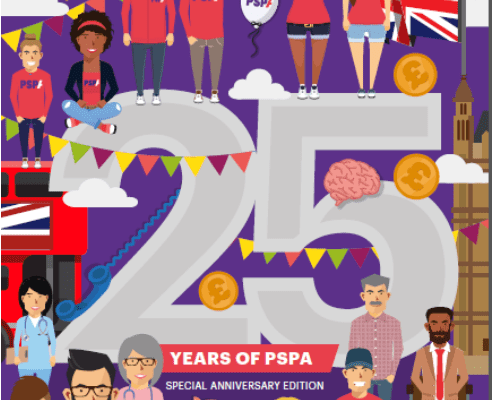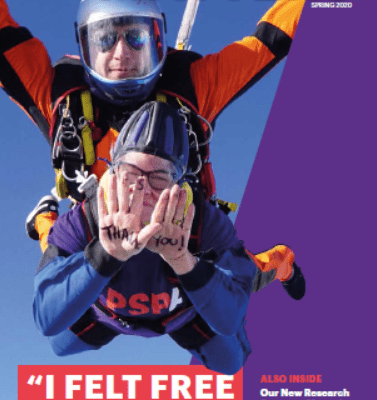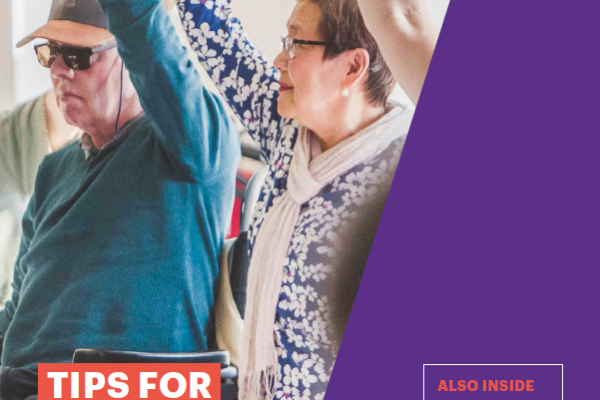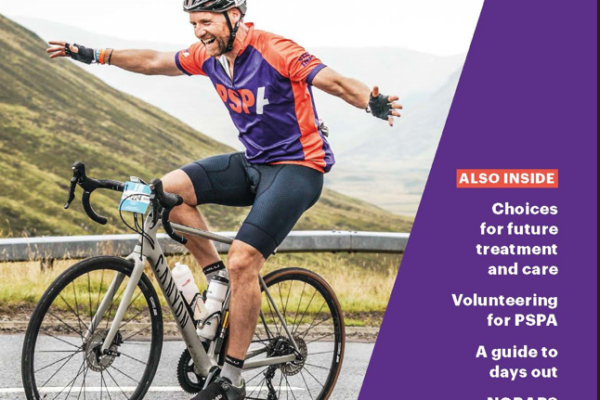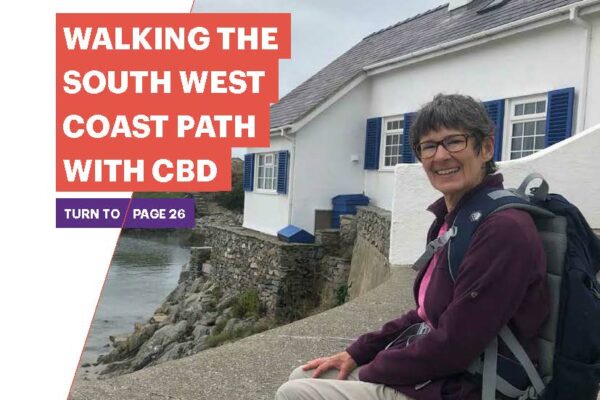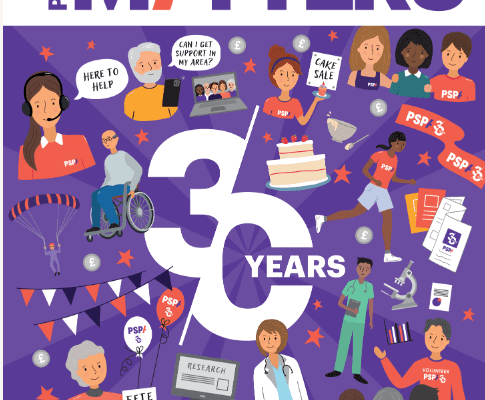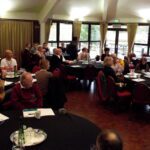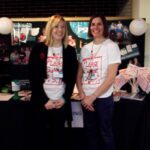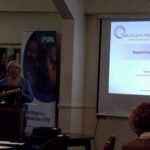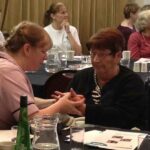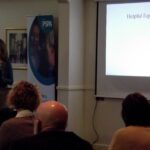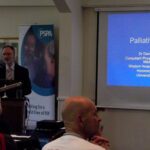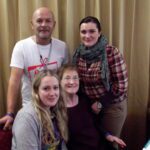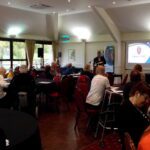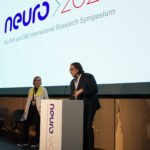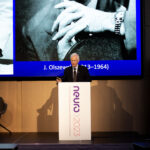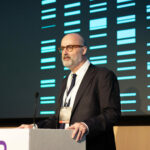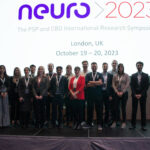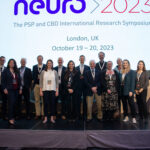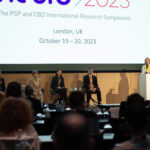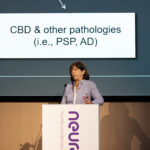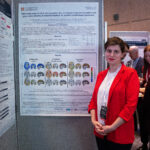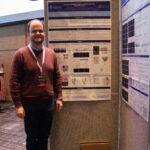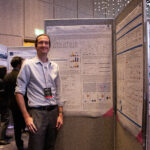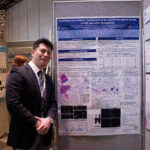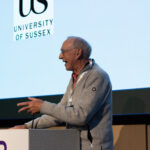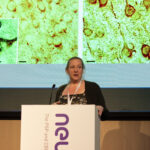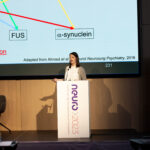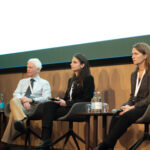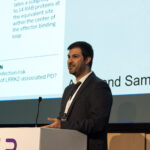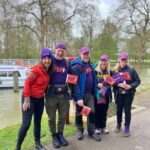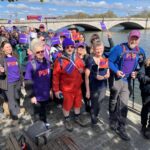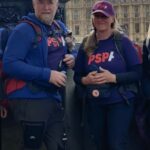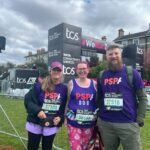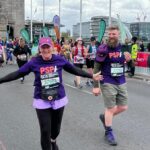PSPA Timeline
Scroll down to the milestones to learn more about our journey
Scroll Down and Click on the milestones to learn more about our journey
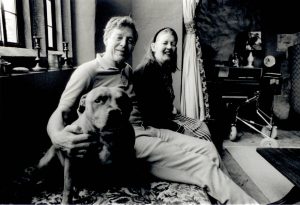
Motivated by his family’s own experience of PSP, Brigadier Michael Koe established PSPA in April 1994, driving forward an ambition of creating a better future. Here we look back at key PSPA moments.
Michael’s wife, Sara, was diagnosed with PSP in 1993 after developing worrying symptoms including problems with balance, speech, swallowing and looking up and down.
Local neurologists were unable to determine what was wrong.
Undeterred, the family continued investigations into Sara’s symptoms. This led to a week’s stay at the National Hospital for Neurology at Queen’s Square, London, under the care of Professor Martin Rossor and Professor Andrew Lees. During this stay, Sara received a diagnosis of PSP.
Driven by the bleak prognosis, Michael began researching what help was available.
He visited the American PSP Association, where he heard one specialist, Dr Irene Litvan, may be close to a cure. Unfortunately, this was incorrect.
Although the trip, was unsuccessful in terms of aiding Sara’s condition, it planted a seed in Michael’s mind. Setting up a charity in the UK to help other people affected by the condition.
When discussing the decision to set up PSPA, Michael said: “Sara and I were upset that no one knew, or seemed to care much about PSP. We were keen to do something to draw public attention to this particularly nasty brain disease and help others living with PSP. We also were determined to raise awareness and funds for research.”
So, in 1994 Michael joined forces with local MP, Michael Morris and friends; Sir Michael Carlton Smith, James Stanford and Sir John Greenaway to establish the UK PSP Association.
On 25 September 1996, Professor Larry Golbe was one of the leading professionals to speak at the first PSP & CBD Research Workshop in Kent (a summary provided in the Society of Progressive Supranuclear Palsy newsletter above).
The workshop was organised by Michael Koe, who was the CEO of PSPA at the time and marked the start of a great relationship with SPSP, now CurePSP. The workshop continued to be held bi-annually until 2018, when it was rebranded as the PSP & CBD International Research Symposium.
Professor Huw Morris has been working with PSPA since 1997 when he was hired as the charity’s first research fellow.
Here Professor Morris shares some insight into how his research career began and his continued relationship with PSPA.
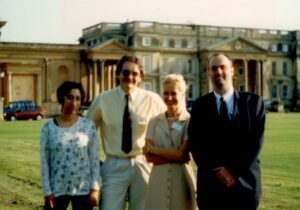
Part way through her neurology training in Edinburgh and Newcastle, Dr Uma Nath was approached by Professor David Burn to write a paper about the epidemiology of PSP.
It was whilst writing this paper, Uma’s interest in the condition grew:
“It was around the late 90’s that I was approached to write a paper about the epidemiology of PSP. At that time, very little research into PSP or CBD had been conducted. It was the fact that there was so little information and knowledge about the disease, together with Professor Burn’s clinical approach that really sparked my interest in the subject.”
With an interest growing, Professor Burn introduced Uma to PSPA and its founder, Michael Koe.
“I met Michael Koe at one of the research events he had organised in Northamptonshire, which is where the charity was based at the time.
“During the event, Michael shared the unforgettable experience of his wife being diagnosed with PSP. The fact they were sent away from the diagnosis appointment with little information and no idea of where to turn to for support or details about what would happen next, and how that then inspired Michael to establish a charity, really struck me.”
Michael helped highlight the basic facts and knowledge that were missing for PSP, including understanding how many people across the UK were affected. Information vital for growing interest and research into the subject.
Discussions led to Michael inviting Uma to conduct a prevalence study, fully funded by PSPA over two years.
In order to establish how common PSP was, Uma conducted a ‘Russian Doll ‘study. This was a three- tiered approach focusing on a national figure, a regional figure and a detailed overview.
“To start, I began to collate a central database of patients affected by PSP. I sent out a letter to around 250 neurologists, asking them to register their PSP patient details. I wasn’t expecting much of a response but I was pleasantly surprised. This exercise saw 577 cases of PSP confirmed.
“Next was the regional stage of the study, where I spoke to clinicians about their PSP patients and the symptoms they were experiencing.
“During the last stage, which was a much more rigorous approach, I worked with three GP surgeries to review their PSP patients. To do this I looked out for key words in the notes, including Steele-Richardson, Levodopa, Parkinson’s or Parkinsonism. In all, I closely reviewed 50 patients through this process.”
Taking this approach, Uma was able to establish a ratio per sample which is an ideal way to suggest a prevalence. Uma found this was 5 in every 100,000. The study also highlighted, it was taking around four years for individuals to be diagnosed with PSP, which is more than half the life span of the disease.
Uma’s study, and resulting papers, were received with great interest by the healthcare community including neurologists, GPs, ophthalmologists and more.
“There seemed to be a real appetite for learning more about PSP. This and the study conducted by Professor N Quinn and Professor A Schrag around the same time, led to more than 60 speaking opportunities across a 24-month period. People were eager to find out more, share best practice as well as improve diagnosis. A real buzz generated, which was exciting for me and I loved to see how it was encouraging people to open up their suspicions of PSP when speaking to patients.”
As well as sharing her knowledge, Uma’s work was celebrated across the UK. Uma’s study received three accolades; The Charles Symonds Platform Presentation Award, The Liversedge Prize from North East Neurologists Association and an achievement award from PSPA. Uma also received a commendation for her thesis.
In addition, her various papers based on the study were published in prestigious journals including Brain and Neurology, again helping to raise awareness of PSP and spark wider interest.
Following her prevalence study, Uma continued her interest in PSP. Uma together with Dr Mark Lee, cowrote an interactive audio-visual training module on PSP for neurologists and trainees.
This training module was updated just two years ago and the impact of her prevalence study, growing research interest in PSP & CBD was very apparent.
“We updated the E Brain PSP training module a couple of years ago. It was amazing to look back at what we knew about PSP when we first developed the module, and to see how much more we have learned about the condition since. Including the fact there are different variants of PSP, which now needed to be added. Having variants also impacts on the prevalence of the condition, seeing numbers growing substantially.”
Dr Uma Nath runs a Movement Disorder clinic in Sunderland Royal Hospital, where she sees patients living with Parkinson’s disease and various forms of Parkinsonism including A Typical Parkinsonism, and continues to support PSPA by sharing her knowledge and insight into PSP & CBD at events.
“Conducting the PSP prevalence study, and the resulting buzz and interest it gave to the condition, so early in my career really boosted my confidence. It was a rewarding and enriching part of my career which also helped me appreciate the collaborative nature of the NHS.
“I have enormous respect for the achievements of PSPA and its far-sighted approach to not only supporting people who develop PSP & CBD but also supporting so much original research. This has had an enduring impact on the research landscape for PSP & CBD in the UK and internationally.”
With magnolias being Sara Koe’s favourite flower, it was no surprise, one of PSPA’s big fundraising dinners was named The Magnolia Ball in her honour.
The event was held at Stowe School in Northamptonshire, where more than 200 guests including the charity’s Royal Patron HRH The Duchess of Gloucester, gathered. Guests enjoyed a three-course meal, and lots of dancing. Fundraising was helped by ticket sales and an auction, with prizes ranging from a week’s holiday in a luxury villa in the Algarve, tickets to Wimbledon and weekends away.
The event took a lot of organisation, however, it was worth it, with £25,000 raised!
Debbie Benadie was one of the first PSPA employees to be hired. Now working as the PSPA Office Manager, Debbie looks back over the 22 years she has been working for the charity.
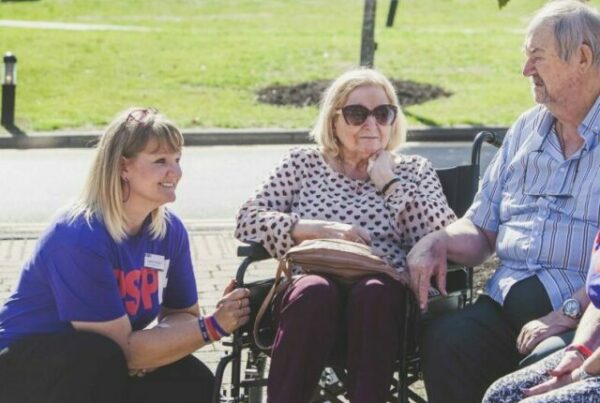
Since PSPA formed, a firm priority has been to keep our supporters informed of the latest news and updates. A newsletter was created to assist with this task in the early years of the charity. In 2008, the newsletter was developed into the 40-page magazine we all know and love as PSPA Matters.
As you can see in our gallery of magazine front covers, the design of PSPA Matters has been refreshed several times. However, the in-depth information, sharing of personal experiences, research news and inspiring fundraising challenges remain firm content favourites.
The magazine is circulated to just over 10,000 people, four times a year. And in recent years, audio files of the magazines have also become available to help more people enjoy the content and feel part of the wider PSP & CBD community.
Download the latest edition of PSPA Matters, here.
To share your personal experience of PSP or CBD or ideas for future magazine content, please email communications@pspassociation.org.uk
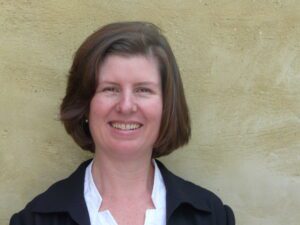
As an Occupational Therapist (OT) working at St Thomas Hospital, London in the 80’s and 90’s, Madeleine Quine (nee Ranicar) had begun to receive referrals to see patients with two conditions she had not heard of before.
The two conditions were PSP & CBD.
At the time, there was little information about PSP & CBD to help Madeleine or other OT’s to assist with their assessments and treatment plans. Madeleine researched, and found the UK Parkinson’s Society had information to share, which they had gathered from America. So, Madeleine worked with the Society to learn more and used this to start writing a guide for PSP & CBD, however for various reasons the document was never printed.
By then, Madeleine had left the NHS, when she spotted a double page article about PSPA in a national newspaper.
Madeleine said: “I couldn’t believe it when I saw the article in the newspaper about a national charity being set up. For years, it had been so difficult, not having an organisation to turn to for advice and information about PSP & CBD. So, I rang Michael Koe to congratulate him on setting the charity up. We got talking about my connection with the conditions, my OT background and I told him about patients I had treated and about the guide I had discussed writing. Not long after, I signed up as a volunteer for the charity in 2000.”
Alongside, Maggie Rose, PSPA Nurse Specialist, Madeleine helped to establish PSPA Support Group in Edinburgh. Michael even came to visit, a couple of years after it had been set up.
Madeleine continues: “The group had been going well in Edinburgh, so Michael came up to visit. It was during this visit that he approached me with the idea of me working for PSPA as one of their Development Officers. I joined PSPA in 2005.”
In her role as Development Officer for Scotland, Madeleine supported the group, set up more groups in Glasgow, Aberdeen and Dumfries and made connections with various healthcare professionals.
Madeleine said: “The charity had been contacted by so many healthcare professionals, I knew there was a need there for developing a guide for therapists. With my OT background it made sense to develop one for the OT profession. As I was no longer a registered OT by this point, I teamed up with two OT’s working at the National Institute for Neurology and Neurosurgery at Queens Square in London: Jo Hurford and Kate Morton.”
After their clinical work, Madeleine would work with Jo and Kate for an hour or two in the evening on content for the guide. It took a fair bit of time to pull together sourcing PSP & CBD journal articles, but the guide was finalised and published in 2008.
“We were so pleased with the guide when it was completed. People seemed thrilled to have a copy as previously, you were very much just learning on the job when a patient with PSP or CBD was referred. I remember going to the College of Occupational Therapist’s conference in Harrogate, and the guides were flying off our exhibition stand. Everyone wanted a copy. The guide had a worldwide impact too. I trained in Melbourne and years after the guide was published I bumped into some OT’s who trained with me and they talked about the guide, not realising I was the Madeleine referenced at the back.”
In 2009, the guide was celebrated with a BMA Medical Book Competition Award, which was presented to Madeleine, Jo and Kate.
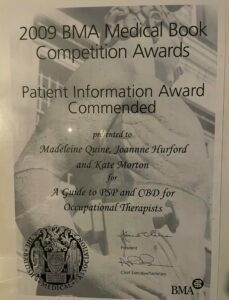
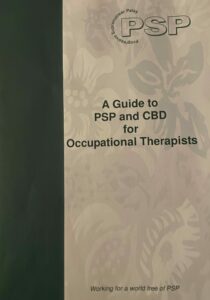
The OT guide is still going strong. Although regularly reviewed and updated, the core information remains.
A big thank you to Madeleine, Jo and Kate for helping to produce this informative publication.
Understanding the positive impact Support Group meetings were having among the PSP & CBD community, PSPA set out to provide more ways for families to connect.
In 2012, our very first Family and Friends Day took place in ! Hosted by Dr Alex Gerhard, Consultant Neurologist, Salford Royal Hospital, day aimed to connect families as well as to provide great opportunities to learn more about the conditions and how healthcare professionals and PSPA can help.
During the day, which was held in Sandbach, Cheshire on 17 November 2012 , we welcomed 41 family members and people living with PSP & CBD to join us for a day of information and connecting, as well as activities such as food demonstrations and massage.
Our Family and Friends Days continue to this day, with the next one planned for June 2024. Keep a look out for more information about where this day is taking place and how you can register to attend for free.
View a few photos from the day below.
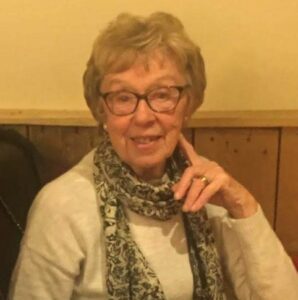
Doreen Walker has supported PSPA since her husband, Raymond, was diagnosed with PSP in 2003.
After becoming a bit unsteady on his feet, Raymond fell off his ladder when decorating. He visited his GP for a check up and the GP referred him for further investigation.
Doreen said: “After his fall our GP referred Raymond for further investigation at our local hospital. The consultant then referred us to Newcastle to see a specialist. It is here, Raymond received his PSP diagnosis.”
Doreen cared for her husband throughout the seven years he lived with PSP, visiting the hospital in Newcastle every three months.
Doreen continued: “It was at the Newcastle clinic I was introduced to PSPA, which at the time was a small outfit being run by Michael Koe and Maggie Rose. Maggie was a PSP nurse and attended the clinic to offer support. She would come into the appointment with us and then following would have a quick catch up about how we were doing. I appreciated this time to discuss any questions I might have.
“Everyone at the clinic and PSPA were very supportive and helpful. And we couldn’t have asked for a better GP, he checked in on us each week too.”
As Raymond’s PSP progressed, and it impacted daily life more, Doreen found she needed some support at home.
“I knew PSPA were at the end of the phone as well as at the clinic, if I needed them. I did ring in between hospital visits a few times, to ask a question or get some reassurance. I received some good advice about funding for care support at home, when I realised I needed some help getting Raymond up and ready for the day and back to bed in the evening. I did get the funding so the advice was very useful.”
Raymond passed away in 2010 and because of the support her and her husband received during their journey, Doreen was keen to stay in touch.
“You can’t help but become close with the health professionals and members of PSPA you speak to regularly. I continued to check in to see how the charity was doing and offer help when needed.
“I remember when Carol joined the charity, to help develop the PSPA Helpline. Carol’s hardworking ethos had things up and running in no time. A year later they were looking for volunteers to help man the evening Helpline and it seemed like a good opportunity for me to get involved.
“I volunteered for the PSPA Evening Helpline for seven years. There is something satisfying about using your own experiences and knowledge of PSP & CBD to help others. It is really important for people to have someone to turn to, whether it is a relative, a friend or a charity. Someone they can talk to without judgement and I felt this was what I was offering as a Helpline Volunteer.
“Although I had stood down as a volunteer by the time COVID-19 hit, I knew how much the pandemic was affecting charities, so I rang in to see if I could help again.
“I was quickly signed up to help stay in touch with PSPA supporters during this difficult time. I had three or four people to ring around once a month, just to check in and see how they were doing and if they had any questions. I did find this very fulfilling.”
Although Doreen isn’t currently volunteer with PSPA anymore, she does check in a couple of times a year to get an update on how the charity it doing.
The PSPA Evening Helpline is still available, with volunteers helping out from 7pm to 9pm, Monday to Friday. In fact, in 2024 the Evening Helpline celebrates its 10th Birthday!
Thank you to Doreen and all our Helpline volunteers for providing essential support to PSPA and the PSP & CBD Community for the past ten years!
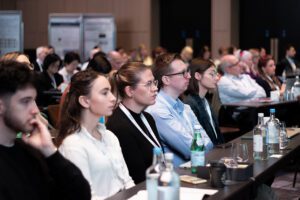
In 2015, PSPA agreed funding for one of the largest studies on PSP & CBD to better understand how the conditions progress.
The PROPSCT-M-UK study is an ongoing, multi stage study led by Professor Huw Morris based at the National Hospital for Neurology & Neurosciences at UCL, London. This study has recruit more than 1,500 people living with PSP & CBD and control participants across 29 study sites within the UK.
The study title means PROgressive SuPranulclEar Palsy CorTicobasal Syndrom Multiple System Atrophy Longitudinal Study UK.
Significant outputs of the study have been the creation of an international research network and the PROSPECT bio bank of data, samples and brain images. The data collected has enabled researchers to better understand underlying disease biology, potential therapeutic targets, genetic determinants, and clinical varieties of atypical parkinsonian disorders.
Here Marta speaks about working on the PROSPECT study, recruiting and supporting participants since 2019.
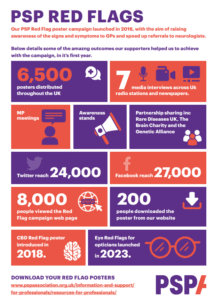
Following our survey of people living with PSP & CBD in 2026, we launch our GP Red Flag campaign.
The survey results highlighted how important GPs are as part of the diagnosis process. Since GPs may only come across one or two cases of PSP or CBD in their career, the aim of the Red Flag campaign is to help highlight the signs and symptoms to them. As well as highlighting the symptoms, the posters also encourages GPs to refer anyone experiencing them to a neurologist for further investigation.
The GP Red Flag campaign was such a success, CBD Red Flags were added to the campaign in 2018. Then in 2023, optician Eye Red Flags were introduced to help highlight important eye changes that can occur.
If you would like to help our awareness raising efforts, you can share the Red Flag Posters with your GP and optician by downloading the posters, below.
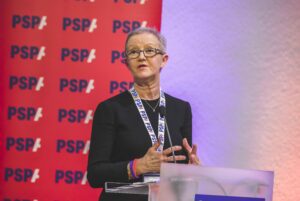 In 2018, PSPA gained support from CBD Solutions CBD to develop a wider pathway of care for people living with CBD. This included the production of the resource ‘A Professional Guide to Corticobasal Degeneration’.
In 2018, PSPA gained support from CBD Solutions CBD to develop a wider pathway of care for people living with CBD. This included the production of the resource ‘A Professional Guide to Corticobasal Degeneration’.
PSPA’s Director of Service Improvement and Development, Carol Amirghiasvand, talks to us about how this resource was developed and how it helped to improve the support available to people living with CBD.
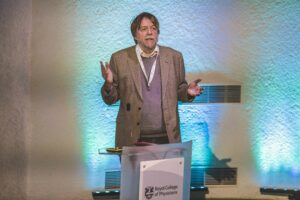
As the two largest charities supporting people living with PSP & CBD in the world, PSPA and CurePSP joined forces in 2018 to host the first PSP & CBD International Symposium.
The two-day event brought together 220 clinicians and researchers at the Royal College of Physicians, London, to share findings, build relationships and encourage collaboration.
The symposium boasted 23 speakers between 25 and 26 October 2018, one of whom was Sir John Hardy, Professor and Chair of the Molecular Biology of Neurological Disease, UCL Queens Square Institute of Neurology.
Sir Hardy shared his Insights into the Genetics of PSP at the symposium and called out for more funding for genetics research to help piece the jigsaw together.
Sir Hardy said: “Collaboration was one of the greatest take aways I remember from the PSP & CBD International Symposium in 2018. The event really helped to facilitate the bringing together of US and European data sets, which has been really important for PSP & CBD research.
“Sharing data means larger sample sizes, which therefore give greater validity to any research results gained.”
In addition to Sir Hardy, stand out presentations from the event included Professor John Steele, Professor Karen Duff, Professor Huw Morris, Professor Henrik Zetterburg, James Rowe. Bess Frost and many more.
Sir Hardy continued: “Events like the symposium always generate a buzz between clinicians and researchers. As well as providing a key arena to share findings and encourage collaboration, it also provides an outlet for discussing how advances in research for other neurological conditions might help unlock essential pieces of the PSP & CBD puzzle. We’re all very excited about developments in Alzheimer’s and hope in turn this will aid understanding of PSP & CBD and how we can produce mechanistic ways for treating the diseases.”
Interest in PSP & CBD research has gained pace over the past ten years, and Sir John Hardy feels PSPA’s support has been crucial to this.
“It was only a few years prior to 2018 that you would struggle to get more than 15 to 20 people attending a PSP & CBD research event. Thanks to PSPA’s investment in PROSPECT and funding the UCL Brain Bank, we know more about PSP & CBD biology than we ever have and interest in the two conditions continues to grow.”
Thanks to this growing interest in PSP & CBD research, Sir Hardy is optimistic about what the next 30 years can bring.
“Thanks to PSPA’s research funding, we now have some real clues to the biology of PSP & CBD. We have some really exciting developments happening in terms of tau degradation, ubiquigent proteins and splicing in tau, and I look forward to hearing more about these studies at future events.”
View comments about the 2018 symposium from Sir Hardy and other speakers, here: https://www.pspassociation.info/research/symposium/
Initial findings from the PSPA funded PROSPECT study were released at the end of 2019 and beginning of 2020.
These findings highlighted the discovery of different phenotypes of PSP, increasing the number of people affected by the condition, and the identification of the genetic variant LRKK2, which can determine the speed in which PSP can develop.
Dr Ed Jabbari worked on the PROPECT study and was the lead author for these finding. With further PSPA funding, Dr Jabbari is continuing this important research aiming to establish biomarkers for PSP.
Below you can listen to an interview with Dr Jabbari speaking about his previous research findings as well as his hopes for his current study.
PSPA Support Grants launched in August 2020 following a successful fundraising appeal during the COVID-19 lockdown.
The Support Grants are available to both people living with PSP or CBD as well as carers.
The grants of up to £250 per year aim to improve quality of life for the person living with PSP or CBD or their carer, by funding or part-funding a piece of equipment or service.
People living with PSP & CBD and carers can apply for the funding each year.
To date, we have awarded a total of 104 Support Grants.
Below is an infographic containing example items for which you can apply for a grant to help fund.
More information about our Support Grants are available on our website or via our Helpline Team.
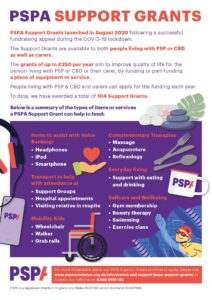
PSPA was chosen to become Talbot Underwritings Charity of the Year partner for 2021/22 after being nominated by supporter Kelly Hooper.
Across the two year of partnership, Talbot employees embarked on a wide range of challenges, big and small, to raise funds and awareness for PSPA. Overall, they raised more than £150,000 for PSPA but Kelly and her team mates were mostly proud of the awareness the partnership brought.
In 2021, PSPA and SpeakUnique teamed up to offer the benefits of voice banking to people living with PSP & CBD.
Here, Alice Smith, SpeakUnique’s CEO, shares details of how the partnership evolved and how voice banking can help support people living with PSP & CBD.
PSPA was proud to launch a new podcast during Carers Week 2021. Initially, forming part of the support offered to carers, the podcast aimed to connect people, share information and share personal experiences. Pavers help us to get the podcast up and running by sponsoring the first series with a community grant chosen by their staff team.
At the end of 2022, with a help of a focus group, we reviewed the podcast and decided to reframe it. Feedback highlighted the importance of people living with the condition feeling heard, and as such the second series of the podcast features episodes that appeal to everyone affected by the conditions. This included hearing directly from people who have been diagnosed with PSP & CBD.
Throughout the years, we’ve covered a wide range of topics; from delayed diagnosis, caring for a loved one, planning ahead, support available and research updates. We are looking forward to season three of the podcast launching in 2025.
If there is a topic you would like us to cover in a podcast, please forward your suggestions to communications@pspassociation.org.uk
In the meantime, please enjoy this montage of some of our most listened to podcast episodes.
At PSPA, we understand a diagnosis of PSP or CBD affects the whole family. To ensure family members who provide care for a loved one living with a diagnosis of PSP or CBD, in June 2022 we launched our Carers Support Groups.
The first UK meeting attracted more than 80 carers, wanting to share experiences, learn information and support each other. With such a large number of carers needing support, the group was rethought, and a second batch of meetings held, focusing on four regions.
The Carers Support Groups have grown from strength to strength, and are regularly evolving to ensure the needs of different family members in a caring role receive the support they need. This includes the introduction of a monthly meeting for men caring for a loved one. And in 2025, we will be launching group meetings for people caring for someone living in a care home and also meetings for bereaved carers.
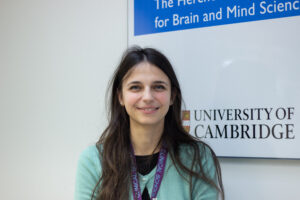
As part of our commitment to funding and promoting research into PSP & CBD, we launched our Small Research Grants launch in 2022.
The aim of the small grants is to help fund small and pilot studies, giving researchers, clinicians and allied health professionals initial data which can be used for larger funding opportunities.
Since the grants launched, PSPA has funded six small grants of varying sizes and covering a range of topics relating to PSP & CBD.
One of the Small Grants awarded was to Dr Maura Malpetti to help support her study looking into the application of neuroimaging techniques (PET and MRI scans) to investigate the pathophysiology of neurodegenerative diseases (how they develop). And to also identify early diagnostic and prognostic markers, signals that can tell clinicians which disease it is and at which stage.
Dr Malpetti said: “The PSPA Small Research Grant played a key role in moving our research on inflammation biomarkers in people with PSP & CBD forward.
“The PSPA support enabled us to generate important data that has been included in a scientific publication, as an open access pre-print and now under review in a scientific journal, and in further grant applications.
“The project showed that lower levels of specific immune cells (“TREM2+”), combined with increased activation of another specific part of the immune system, characterise people with PSP, CBD and related conditions, as compared to healthy volunteers. This particular dysfunctional immune “signature” is related to how fast people with these conditions clinically decline.
“This was a key pilot study to expand our research programme and secure further funding (i.e. a project grant with CurePSP).”
Details of the other five studies can be found on our website here.
Application for our 2024 Small Research Grants closed on 15 November. Updates of who receives one of these grants will be available in early 2025.
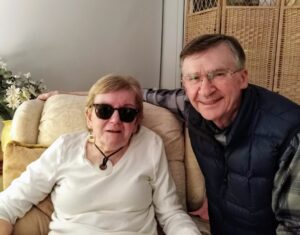
A generous grant from Global’s Make Some Noise enabled us to launch a brand new service in February 2023; the PSPA Link Volunteer Service.
This service sees trained PSPA Volunteers offer one-to-one support to individuals and families who need help coming to terms with a diagnosis or a certain challenge. The service is delivered in up to 12 in-person visits or telephone calls.
David Pugh signed up to become a PSPA Link Volunteer providing one-to-one support to people affected by PSP & CBD, using his experience of caring for his wife.
David said: “After Rosalind was diagnosed with PSP in 2017, she was very keen to talk to everyone she could about the conditions. She read all there was to read and was very keen to educate everyone. Following her death, and upon seeing PSPA’s call for Link Volunteers, I felt signing up would be a great way to continue Rosalind’s legacy and do my bit too.”
David continues: “I remember speaking to the PSPA Helpline whilst Rosalind was still alive, and what I really appreciated was an unspoken understanding. No need to explain what PSP is and how it was impacting my life, before I got onto the real reason I reached out, which was really refreshing.
“As a PSPA Link Volunteer, I feel I get to give this same sense of understanding back to the people I support. I know people have appreciated this and the fact my support to them is very much tailored to their current needs, whether it is better understanding their diagnosis, planning for the future, or pointing them to local support and care.”
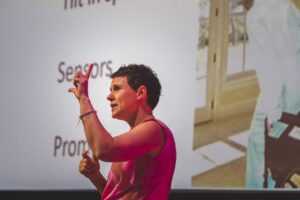
To help raise awareness and understanding of PSP & CBD amongst healthcare professionals, in early 2023 we published a brand-new guide to PSP & CBD, this time providing support and information for physiotherapist.
Jade Donnelly, Specialist Physiotherapist and APS Coordinator at Southampton General Hospital, led the production of the guide alongside PSPA and several other physios.
Jade said: “For the past six years I have been coordinating a specialist clinic for people living with atypical parkinsonian syndromes (APS), also referred to as Parkinson’s plus. As a physiotherapist I was keen to ensure patients receive the right intervention and advice at the right time throughout the course of their condition. PSPA has excellent information for professionals including guides to PSP & CBD for OTs, GPs and the Primary Healthcare Team. As a physiotherapist I felt it was important that there were also physiotherapy guidelines. PSP & CBD are rare movement disorders, they are not taught or discussed at an undergraduate level and many therapists will not come across the conditions until they appear on a ward or referral list. There is also a lack of evidence base to what therapy intervention is most appropriate.
“With this in mind I was delighted when PSPA agreed to developing the new physiotherapy guidelines. They have been developed using available evidence and professional opinion. To write these guidelines required the support of several physiotherapists from across the UK who volunteered to share their knowledge and expertise. The therapists came from a range of backgrounds, including falls specialists, community rehabilitation and palliative care. Our aim was to share knowledge, best practice and evidence base for this client group. We hope we will be able to build on these guidelines in the future to create pathways of care and aspire to having NICE guidelines or PSP & CBD. We all agreed on the professional reasons for having the guidelines but for many of us it was more personal.
“For me, it’s a desire to make a difference and improve the patient experience and raise awareness of the conditions. Weekly I speak to patients with PSP & CBD, as well as their carers. I see first-hand their challenges and frustrations. They value having someone who has heard of their condition and someone who has an insight into their problems. I remember advising a therapist in the Midlands who was seeking advice for a patient she was treating and she asked “Why is there no physio guide? I’ve read the OT guide and professional guide, both were helpful but why no physio guide?” So, I was delighted when we were given the green light to go ahead with this project.
“Often simple changes can make a huge difference to people living with the conditions and their families. We hope the guide has illustrated some of these strategies.
“Thank you to the team, who helped produce the guide, including Ciara Baker – Clinical Specialist Neurological Practitioner, Community Neurology Service, Dorset. Emma Secker – Specialist Palliative Care Therapist in the community in Northumbria Louise McGregor – Therapy Consultant at St Georges’, London, and Rebecca Bray – Specialist Neurological Physiotherapist from Wiltshire.
“We hope that the guidelines will be a helpful, one stop shop for physiotherapists. There are top tips sections for easy reference and we have also included a couple of case studies. Evidence and research is constantly developing, so the guidelines will be reviewed and updated regularly.”
If you are a physiotherapist and would like a copy of the guidelines, you can download them on the PSPA website.
Or you can request a copy by contacting the PSPA Helpline.
If you are living with PSP or CBD and have a physiotherapy appointment coming up please request a copy from the Helpline and share with your physiotherapist.
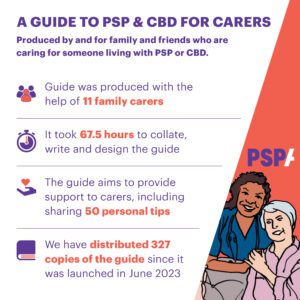
We understand a diagnosis of PSP or CBD impact the whole family. Particularly those who provide care for a loved one, whether closely or from a distance.
To help provide information and support, to people providing care for a loved one, we produced a guide to PSP & CBD for carers.
We worked alongside a group of people in caring roles to co-design the content for the guide, which not only provides useful information but also tips from carers from their lived experience.
To sum up how the guide was developed, and the impact it has in helping families, we’ve produced an infographic with some useful stats in.
Our guide for carers is available to download on our website. Alternatively, you can contact the PSPA Helpline and we will post a copy out to you. Call 0300 0110 122 or email helpline@pspassociation.org.uk
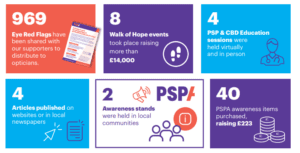
Our 2022 survey of people living with PSP & CBD highlighted that 60% of people are still initially diagnosed with another condition. Most commonly, misdiagnosis tend to be Parkinson’s, stroke and depression.
To aid earlier diagnosis, we developed Red Flags for PSP & CBD in 2016 to help GPs spot key signs and symptoms of the conditions and encourage referrals to Neurologists.
Understanding, eye changes are key symptoms which can help to differentiate PSP from conditions such as Parkinson’s, we also developed Eye Red Flags for opticians in June 2023. The aim of the Eye Red Flags is to help opticians look out for key changes during annual eye checks, and flag a need for further investigation if needed.
As part of our annual PSP & CBD Awareness Week activities, we encouraged all our supporters to help distribute the Eye Red Flags to their local opticians. The above infographic shows the impact we collectively had, in raising awareness of PSP and eye symptoms, with more than 900 Eye Red Flag posters distributed during the week. The number is always rising, as distribution of the Red Flags for GPS and opticians is an ongoing awareness tasks our supporters regularly get behind.
If you’d like to help spread the word to opticians, you can download an Eye Red Flag posters on our website, or contact our Helpline, on 0300 0110 122 or email helpline@pspassociation.org.uk, to receive a hard copy in the post.
In October 2023, PSPA and CurePSP teamed up to host an international research symposium in London.
The event attracted more than 220 clinicians and researchers from 20 countries, to learn, update and find opportunities to collaborate to help advance research into PSP & CBD.
Topics presented ranged from an overview of across 60 years of PSP & CBD research, updates on research into biomarkers and information about clinical trials.
Highlights from the two-day event were fully captured in a special edition of PSPA Matters.
View photos from the event below and reads overviews of the talks in PSPA Matters, here.
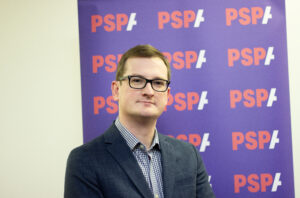
In our 2022 survey of people living with PSP & CBD, you highlighted awareness raising as one of your top priorities. To further invest in this area, to help improve care and support for people living with PSP & CBD, we recruited our first Director of Policy and Influencing, Mark Jackson.
Before coming to PSPA, Mark was a Senior Policy and Research Manager at Marie Curie, where his work focused on financial security for people at the end of life. Mark led Marie Curie’s successful #Scrap6Months campaign to improve access to fast-tracked benefits for terminally ill people. Now he is turning his attention to PSP & CBD, as he explains in his own words here.
“I’m just a short time into my role but already I’m struck by how much impact such a small charity has. PSPA is small but it is certainly agile. It is also very close to the people it exists to support and that is very important to me.
“Even though there hasn’t been a dedicated policy and campaigning function, it’s incredible to hear about so many PSPA volunteers raising awareness among GPs and opticians, and for being so involved in our awareness campaigns. I hope to build on this great work. Already I can see so much opportunity for us all to unite around campaigns that will have lasting impact on those living with PSP & CBD.
“To drive forward research, to improve diagnosis, to ensure people have access to the latest treatments and to make the incurable curable, we need to campaign. When campaigns are successful it has a huge impact on people’s lives. In my last role, successful campaigns meant people living with a terminal condition didn’t have the burden of going through multiple assessments or experience delays in accessing benefits. It helped ease the financial pressure for people.
“Clearly there is a significant problem in people with PSP & CBD getting an accurate and timely diagnosis. There are not enough neurologists. Not enough money is invested in research. People with PSP & CBD are not all getting access to services quick enough. And carers
are left with little recognition or support. We have a lot to work through to make lives better for people living with the condition today.
“With a General Election coming up this is a very good year for us to build new relationships with a political audience. Whoever forms the next Government will have to reform the social care system. As part of this reform, the value of unpaid carers must be considered along with how the system can best support them. This gives us an opportunity to build relationships with potential MPs while they’re still parliamentary candidates. At the moment I’m developing our awareness campaign that will ask people to contact their parliamentary candidates about the vital role of unpaid carers.
“I want to be accessible to people and would welcome anyone from our PSP & CBD community to get in touch to say hello, or share a problem they are facing. I’m looking forward to working with the PSP & CBD community to drive change in both care and research funding.
“I will also be working with the team to build awareness of PSP & CBD. We must raise awareness to give both conditions greater prominence in the media, homes, hospitals, laboratories and government buildings. It will take collaboration to achieve our goals, but with the determination and dedication I’ve already seen from the PSP & CBD community, I know we will get there.”
You can read more about how our campaigning and influencing work is developing in PSPA Matters Edition 3 and Edition 4.
Raynor and Moth Winn have been supported by PSPA since Moth’s CBD diagnosis in 2013.
As well as gaining support from PSPA’s Helpline, Raynor and Moth attend PSPA Support Groups when they can and also support PSPA’s research efforts.
As a result of the support they have received, and wanting to raise as much awareness as possible the couple have regularly worked with PSPA.
The couple regularly raise awareness and funds for PSPA. In 2023, Raynor and Moth walked the London Marathon, raising approximately £15,000 for the charity.
This fundraising continued in April 2024 too. The couple first walked the Thames Path in April, and following a few days break, then walked the London Marathon again, raising a further £13,000 for PSPA.
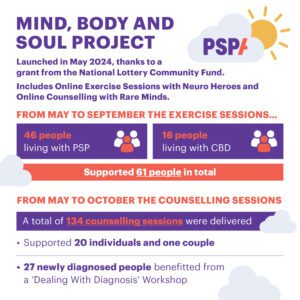
Thanks to a generous grant from the National Lottery Community Fund, we launched two brand new support services as part of our Mind, Body and Soul Project.
The two services were Online Exercise Sessions developed with Neuro Heroes, and Telephone Counselling developed with Rare Minds.
Both services launched in May 2024, and received a really positive welcome from the people we support.
As the infographic above highlights, in the first few months a total of 61 people have utilised the Online Exercise Sessions, which aim to help improve flexibility, strength, fitness and balance.
In addition, a total of 134 counselling sessions were delivered between May and October, helping to support 20 individuals and one couple.
If you would like to learn more about our Online Exercise Sessions or our Telephone Counselling, please get in touch with our Helpline on 0300 0110 122 or by emailing helpline@pspassociation.org.uk
With the aim of creating a step-change in PSP & CBD research, we developed a new research appeal called Understood.
Driven by our community, people living with the diseases, their carers and families, to change the future, PSPA is fighting for PSP & CBD to be Understood.
To become Understood, we are launching a £2 million appeal to fund research that will help unlock:
- Quick and accurate diagnosis
- Immediate treatment
- Consistent standards of care providing symptom management within two months.
More details about the appeal will be launched in April 2025, alongside the UK premiere of The Salt Path film. However, you can still read a bit more about the goals and ambassadors of the appeal on our website.
